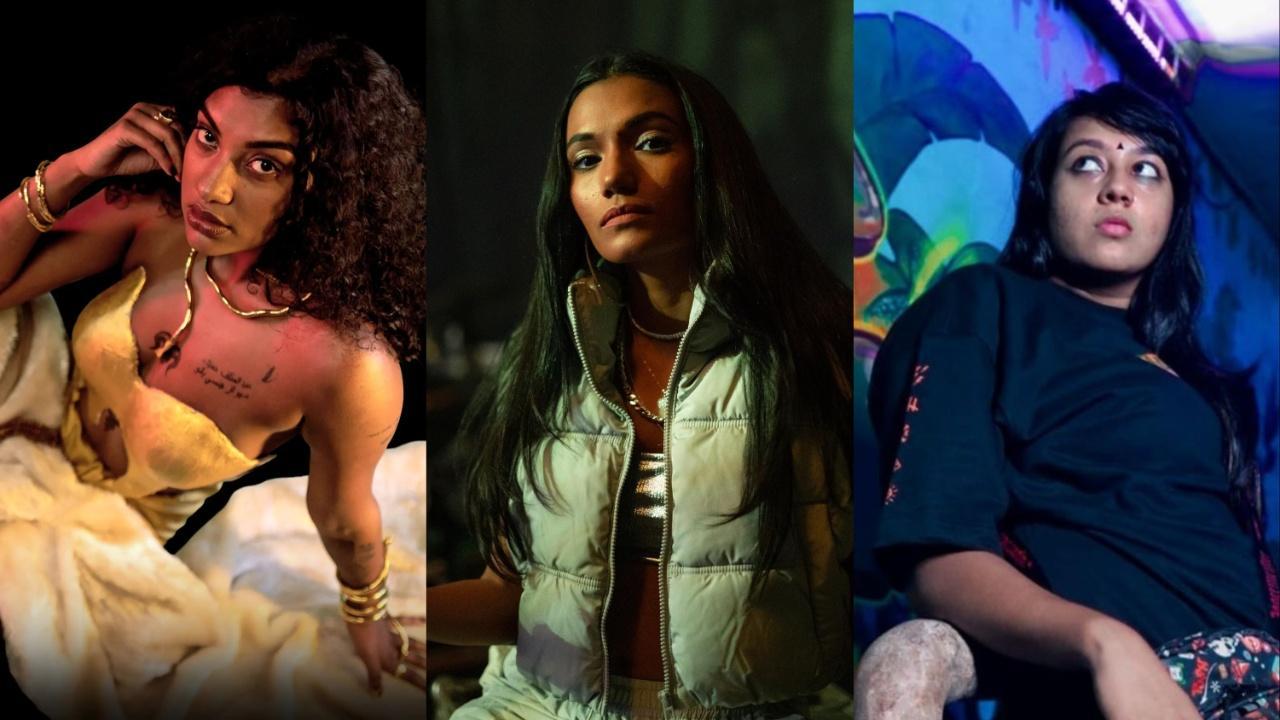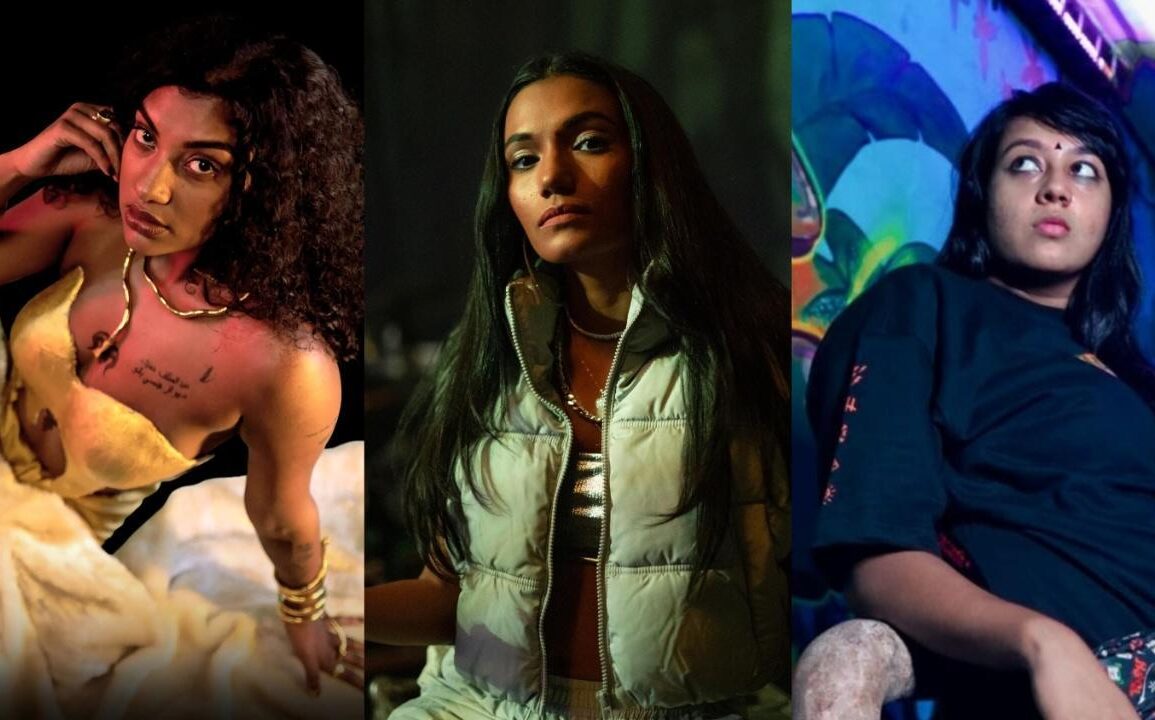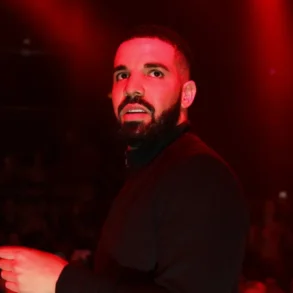With hip-hop celebrating its silver jubilee in 2023, female rappers in Indian hip-hop – Dee MC, Irfana and Krantinaari pay homage to a culture whose origins lay in resistance and rebel

Lyrical prodigies – Irfana, Dee MC and Krantinaari
Mumbai: The green room at Mehboob Studios is swell with the matriarchs. Dee MC, Krantinaari and Irfana have arrived in Bandra for Spotify Rap 91 Eve to remind us that – since its inception, there have always been women in hip-hop.
From its genesis in the Bronx, New York (1973) – hip-hop owes its humble birth to Cindy Campbell, the teenage girl, who threw a block party to buy clothes for school. The American B-girl, along with her brother (DJ Kool Herc.) sparked an event that went down as a historic moment: when hip-hop gained momentum in mainstream pop culture.
ADVERTISEMENT
50 years hence, the fruit has ripened as the matrons join forces to dish rhythm and beats laced with lyrics from the counterculture. At the backstage, this writer spoke to the trio on how hip-hop shapes their identity and dares them to forge a distinct path.
What Indian rap artists owe to hip-hop music
Leading the squad is the prodigy – Deepa Unnikrishnan AKA Dee MC, who is a rapper, singer and songwriter from Mumbai. Along with delivering numbers like ‘Khoyi Si’ and ‘LA to Bombay,’ she is judges talent at the Indian rap/hip-hop reality show – MTV Hustle 2.0.
Tracing her roots to the art, Dee shares: “I wanted to choose a path that is so less travelled by women that it gave me a shot at becoming one in a billion. So, it was obvious that the bar was set very, very low.”
She recalls how the introduction to hip-hop culture granted her a sense of belonging. “It blew my mind when I learnt about rappers from Kashmir to Kanyakumari, who don’t even know each other. They’ve never met each other, but they’re fucking text-battling with each other online! That made me feel like I found a community for myself.”
Although widely considered a synonym for rap music, the term hip-hop blankets a complex culture comprising five elements: deejaying, rapping, graffiti, B-boying and knowledge of self. Originating at society’s fringes, the hip-hop movement is largely surrounded by myths, mystery and obscurity around its origins.
Sitting aside Dee is Krantinaari – the Mumbai-based rapper whose verses portray the lived experiences of women, dealing with PCOS, colour and body positivity. True to her name, she embodies a rebellious spirit that is aimed at quashing age-old dogmas.
She opens up about foraying into hip-hop: “Early on in 7th grade or something, I started playing basketball. And when there’s basketball, the music that comes with it is hip-hop.”
Often, basketball courts in urban neighbourhoods turn into informal stages for hip-hop gigs. Rappers, b-girls, b-boys, disk scratchers and MCs jam to postural semantics during pick-up games or community events at the court. Owing to the dynamic nature of basketball, the rhythmic beats and lyrical flow of hip-hop seamlessly complement the sport, raising the collective levels of excitement and energy.
Continuing on her journey, Krantinaari shares: “I used to get bullied by the people within the team and outside because I didn’t know the English language. To battle this – the music that came to my rescue was rap and reading those lyrics taught me a language.”
So, developing an entire understanding of a language, gaining the confidence to confront people and becoming a part of this community – became the way to assert her individuality and find the expression that once was missing.
South Side Menace: Irfana Hameed
Adding a Southern layer to this conversation is Irfana Hameed, a Kodaikanal-based rapper and singer who is making waves with her numbers: ‘Southside Menace,’ ‘Sheila Silk,’ and live DJing at intimate events.
Irfana opens up about hip-hop and the role it plays in defining her identity. “Initially, when you learn about hip hop, you learn that it comes from a place of struggle. Thus, it becomes a voice for people who usually don’t have a voice.”
As she outlines, hip-hop’s genesis can be traced to the Western marginalised communities facing socioeconomic challenges and inequalities back in the 70s. Hip-hop emerged as a medium for Black, Latin and Caribbean American youth in the Bronx to highlight systemic discrimination and gave them a language to express dissent.
From this crucible of creativity, hip-hop evolved into a powerful force that not only reflected the struggles of its originators but also became a tool for empowerment and a global platform for social commentary.
Initially, Irfana began rapping about her identity struggles given her Islamic background and gender. “Now it’s starting to become more about being a female in hip hop because it begs to be so. We take a stand and are like, yo, listen, no matter what, we’re here to stay.”
“The audience also is taking some time to get used to listening to female rappers and I see a lot of that in the comment sections on social media. Despite garnering support, there are still sentiments of toxicity like: can women even rap?” retorts Irfana.
The ‘boy gang’ dominated music has heavily relied on presenting women as objects of conquest or beauty props in their clips. Often, the lyrics are marked with braggadocious lyrics about violence, guns, flex and money with women’s versions of stories largely missing.
Nevertheless, there has been a noticeable surge of female representation in hip-hop in recent years, marking a shift in the music landscape. Females in the Indian hip-hop scene, are not only changing the narrative but also toppling orthodox ideologies that sprout from a patriarchy.
Challenges of being a female in Indian hip-hop
With a handful of headlining female rappers like Hard Kaur and Rajakumari, Dee has been steadily establishing the reins of her artistry over the years. However, the journey has come with its own set of pricks and potholes.
“It’s like, it’s always been 9 people giving us love and one person spewing hate. For me, the biggest problem was to become financially independent” – shares Dee. Post completing her graduation at 19, she has maintained a decade-long, uninterrupted work record to support her passion.
What about familial support? – we ask.
“I come from a family that is reserved and believes in only working for other people, so there’s nobody who has ever thought of taking risks to set up a business of their own. They’ve always worked for someone else.”
“The entire idea of fending for yourself without any constant salary is such an alien concept for them. Uske upar se music se paisa banana aur wo bhi bahar gaon ka music (laughs). It was draining to get them on board. Hence, I knew that if I wanted to do anything with my life, I had to earn and move out of my house. So, being a woman, that is the biggest thing I had to work towards.”
At the age of 19, when most Indian children dwell in the comfort of their homes or attend college, Dee had to get out of that safe environment and build her life from scratch. Despite her family living in Bombay – she lives separately to be able to pursue her passion with full ammo.
Today she has overcome her shortcomings to become one of the fiercest women to come out of India and represent the country internationally. This includes her selection into a group of international artists who were mentored by Jason Derulo in Los Angeles, U.S.A. in 2022.
While Dee continues to inspire us galore, Krantinaari has a more scholastic approach to addressing the challenges that mar womanhood. She explains: “Women usually are conditioned to listen or do things in a certain way. They will be put into this trap of fairy tales and they will be like, Oh, that Prince Charming is going to come and rescue me.”
“As a woman, you’ll be deluded to listen to Arijit Singh the whole time. And you’re going to be in love most of the time. But that is just not the case! As you can see, I’m a tomboy myself and women can be this way too,” she emphasises.
Not just women but men have also been tied to gender-based roles which inhibits their true expression and ideas. “They are put into this whole churning, struggling and earning for the family cycle. These two bifurcations make you realise how limiting it is for women to pursue music as a choice, and that is why you don’t see women in the crowd.”
She provides more insights into why there is a limited presence of women particularly in hip-hop and rap audiences. “You don’t see women because they don’t relate to what boys are talking about. But if I talk about PCOS, if I talk about colour, then women are going to understand that hip hop is more than just about your struggling life or making these hustling moves.”
Taking Kranti’s stand one notch further, Irfana opens up about her hustling moves into hip-hop music as a woman. “I’m a Muslim, so it isn’t very conventional for me to be performing in front of people. I faced a lot of obstacles when I was starting out because rapping and hip-hop didn’t go down well with my extended family.”
As time went by, things got back on track for Irfana as she navigated her journey around hip-hop. However, she did face backlash on social media: “I received Islamic death threats. Though it’s very, very sparse, but those are the only negative messages that I’ve gotten.”
Hip-hop as a way of life
Dee dives straight into what about hip-hop culture appealed to her. “Just the ability to recite something so fast was what drew me to Hip-hop. Fast part meko bolne ata hai and that is my flex,” she tells us with a wicked smile.
Additionally, her training in Bharatnatyam sharpened her grasp of the rhythm required for hip-hop. She’s in it to create an impact with the power of words. “In a way, hip-hop is bringing that lyricism back. It’s bringing the importance of painting pictures through your words.”
She unravels her understanding of true hip-hop. “In this work of art, keeping it real is the one thing that is expected of you. No matter what you’re doing, graffiti, dance, turntabling whatever – keep it real. Write about what is real. If you don’t have the money, don’t talk about money just for the heck of it.”
For Krantinaari, her lyrics are her way of documenting the stories of women around her. “I’m still rooted to being all rageful. But, I also am shifting to being joyful because there are two sides to me. I’m like full bakch*d at so many times and serious at other moments, so these dynamics of women need to find a space in their music as well.”
Irfana, who has worked with Parimal Shais – a prominent Bangalore-based music producer and DJ, has always loved writing poetry, she tells Midday. It was in college that hip-hop struck her and left her inspired. “I started writing my own verses and when I came back to India, I saw this huge growth of indie music happening here.”
“As we speak, it has turned into this huge movement, with a scalable industry that has taken over the world. Hip-hop is so raw, it’s unlike any other music form,” Irfana speaks eloquently.
“I’m a small-town girl from Kodaikanal who went straight to university in Canada. So, when I came back to India, I started experimenting with some friends during COVID-19. Things just sort of snowballed from there and here I am!”
One advice for budding female rappers in India
Irfana: You’re never going to get to that point where you’ll be fully confident and brave enough to be a rapper if you don’t start. So, just drown out the noise and start putting your work out there. It’ll happen fast if you just start.
Dee MC: Stay true to yourself. Know very well why you’re doing this. If you’re doing this for fame and attention, then the sooner you start, the sooner you quit. If you look at the community aspect, you see that it is a lifestyle and a discipline that takes time to build. Nothing happens over time.
Krantinaari: I know it sounds super cheesy, but you have to believe in yourself to the level of being called a maniac. People might mistake it for ego, but it’s self-love. It’s belief in yourself. And any woman who is assertive will be called a bitch. So be ready for that.
 Subscribe today by clicking the link and stay updated with the latest news!” Click here!
Subscribe today by clicking the link and stay updated with the latest news!” Click here!

This post was originally published on this site be sure to check out more of their content.









